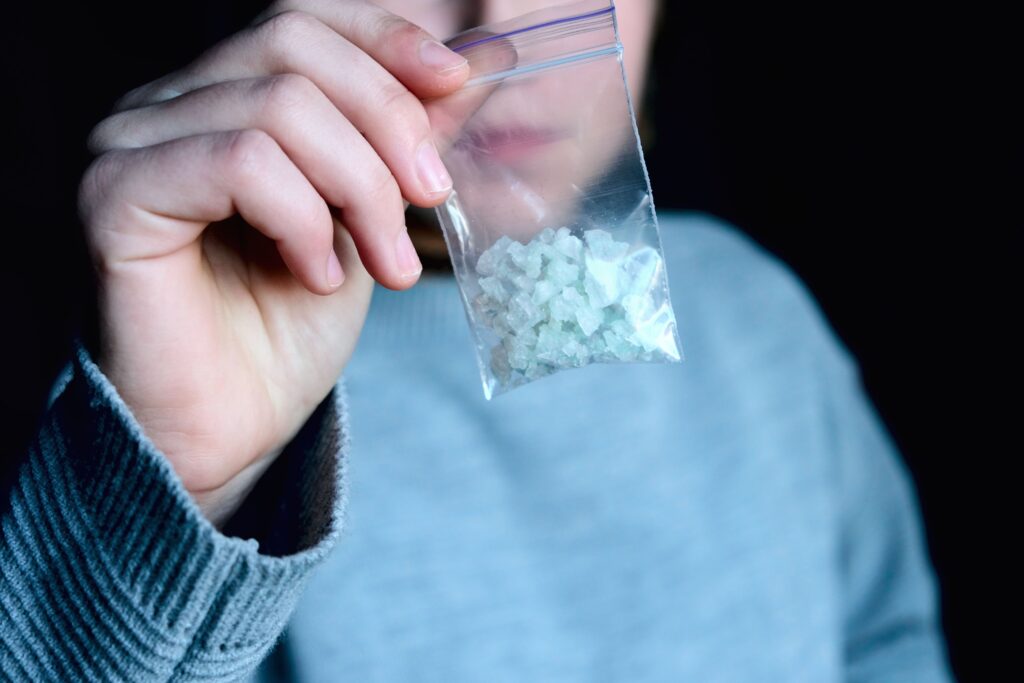Meth Addiction Treatment in Boulder, CO
The 2021 National Survey on Drug Use and Health found that 0.9% of people aged 12 and over were past-year methamphetamine (meth) users. This percentage represents 2.5 million people. Further, the Centers for Disease Control and Prevention (CDC) reports nearly 33,000 Americans died from an overdose involving psychostimulants in 2021. These numbers appear to mask regional variability. Methamphetamine use across the United States has stayed relatively steady over the recent years. However, the highest impact has been in the western and midwestern regions of the US. For this reason, Flatirons Recovery offers safe and effective meth addiction treatment in Boulder, CO.
Meth: A Brief Overview
Methamphetamine, also known as meth or crystal meth, stands as one of today’s most dangerous and addictive drugs. Its rising popularity results from its accessibility and high addictive potential. Operating as a potent central nervous system stimulant, meth significantly impacts brain reward centers. Thus, driving addiction and causing numerous health problems. However, effective treatment programs, like our meth addiction treatment in Boulder, CO, exist to combat meth addiction.
Methamphetamine is classified by the Drug Enforcement Agency (DEA) as a Schedule II stimulant under the Controlled Substances Act, owing to its extreme potential for abuse and limited FDA-approved medical use. Desoxyn® is the sole legal meth product, prescribed sparingly for conditions like ADHD and obesity due to misuse risks.
Typically obtained illicitly, meth comes as a white powder or crystallized rocks, known as “crystal meth.” Its usage involves oral ingestion, snorting, smoking, or injecting, with smoking or injecting leading to bingeing and tolerance development.
Mexican drug cartels chiefly supply US meth, producing ample high-quality, low-cost variants. Domestic labs contribute on a smaller scale. Yet, these labs pose many environmental hazards. Meth’s effects include accelerated brain-body communication, energy surges, enhanced mood, heart rate increase, and appetite suppression. Its misuse risks are further amplified by the addiction potential.

Why is Meth Highly Addictive?
Methamphetamine is highly addictive due to several factors stemming from its short and long-term effects on the user. Consequently, meth provokes a dopamine flood, a neurotransmitter that primarily controls the brain’s reward system. Thereby, eliciting feelings of euphoria and extreme satisfaction. Add to that, this neurotransmitter release reinforces pleasure-seeking behavior.
Additionally, the method of use, whether smoked, injected, snorted, or orally consumed, allows for a rapid and intense high. By rapidly crossing the blood-brain barrier, the rush and duration of its effects are heightened. Therefore, increasing its addictive potential. In addition, as a stimulant of the central nervous system, meth boosts energy levels and sharpens focus. This enhancement is attractive for those seeking increased productivity or evasion from boredom and fatigue.
However, continuous meth use leads to tolerance, prompting escalated usage. Abruptly stopping or reducing intake can cause withdrawal symptoms like fatigue, depression, anxiety, and the inability to derive pleasure. Thereby, leading to an addiction cycle. Over time, prolonged meth use significantly alters brain structure and function. It damages dopamine receptors, disrupting dopamine production and the normal functioning of the reward system. As a result, users rely on meth to compensate for the dopamine deficit.
Psychological factors also contribute to meth addiction. Whereas, many users turn to the drug to alleviate emotional pain, trauma, or anxiety. The intense high provided by meth temporarily relieves these underlying mental health disorders. Thus, leading to a cycle of psychological dependence.
What Does Meth Addiction Look Like?
Meth addiction can manifest with various physical, behavioral, and psychological signs. It’s important to recognize these signs early and seek professional help and intervention. Here’s what meth addiction might look like:
Physical Signs
- Drastic weight loss and malnutrition due to reduced appetite and neglect of nutritional needs
- Skin issues such as acne or sores (caused by obsessive picking or scratching)
- Dental problems known as “meth mouth” (characterized by decay, gum disease, and tooth loss due to poor oral hygiene and teeth grinding)
- Rapid or irregular heartbeat and increased blood pressure (leading to potential cardiovascular problems)
- Dilated pupils and hyperactivity for extended periods
- Excessive sweating and a rise in body temperature
- Sleep disturbances and insomnia
Behavioral Signs
- Restlessness, hyperactivity, and an inability to sit still for extended periods
- Repetitive or obsessive behaviors, such as picking at the skin
- Increased secrecy and withdrawal from family and friends
- Engaging in risky or impulsive behaviors
- Neglecting responsibilities at work, school, or home
- Decline in personal hygiene and grooming habits
- Erratic and unpredictable mood swings (marked by irritability and aggression)
Psychological Signs
- Intense euphoria followed by crashing lows (leading to cravings for more meth)
- Paranoia, hallucinations, and delusional thinking (sometimes results in violent or erratic behavior)
- Anxiety and depression (worsening as addiction progresses)
- Cognitive impairments (memory loss, difficulty concentrating, and poor decision-making)
Social and Lifestyle Changes
- Neglect of personal relationships and social isolation as the addiction takes priority.
- Financial difficulties due to spending money on acquiring meth
- Legal troubles resulting from engaging in illegal activities to obtain or fund the drug
- Loss of employment, education, or housing due to neglect of responsibilities and personal well-being
Tolerance and Withdrawal
- Developing tolerance over time (requires larger amounts of meth to achieve the desired effects)
- Experiencing withdrawal symptoms when attempting to quit (fatigue, depression, intense cravings, increased appetite, and irritability)
In summary, recognizing these signs of meth addiction is crucial for seeking help as early as possible. Meth addiction is highly destructive and can lead to severe physical and mental health consequences. If someone is struggling with meth addiction, reach out to our team of addiction specialists about our meth addiction treatment in Boulder, CO. Get started on the path to healing and recovery.

How Is Meth Addiction Treated at Flatirons Recovery?
Meth addiction treatment typically involves a combination of behavioral therapies, counseling, support groups, and medical interventions. Given the complexity of addiction, a comprehensive approach is essential.
Here’s how meth addiction is commonly treated:
- Cognitive-behavioral therapy (CBT)
- Dialectical behavior therapy (DBT)
- Acceptance and commitment therapy
- Motivational interviewing
- Family therapy
- Medications
- Dual diagnosis treatment
- Individual and group counseling
- Eye movement desensitization and reprocessing (EMDR)
- Trauma-informed care
- Support groups
- Experiential therapies
- Aftercare
Successful meth addiction treatment in Boulder, CO is individualized and may involve a combination of these approaches. The support of trained professionals, a strong support system, and the individual’s commitment to change play crucial roles in achieving and maintaining recovery.

Find Effective Meth Addiction Treatment in Boulder, CO
At Flatirons Recovery, we firmly believe that overcoming meth addiction is not just about halting drug use but about healing and rebuilding your life. We are committed to helping individuals rediscover their strength and self-worth through a journey of recovery that is supportive, comprehensive, and personalized. With a dedicated team of professionals and an evidence-based approach, we are here to guide you every step of the way as you embark on a new, healthier path free from addiction. Let us help you reclaim your life from meth addiction and embrace a hopeful and fulfilling future.
Contact us today to learn about our programs for meth addiction treatment in Boulder, CO.